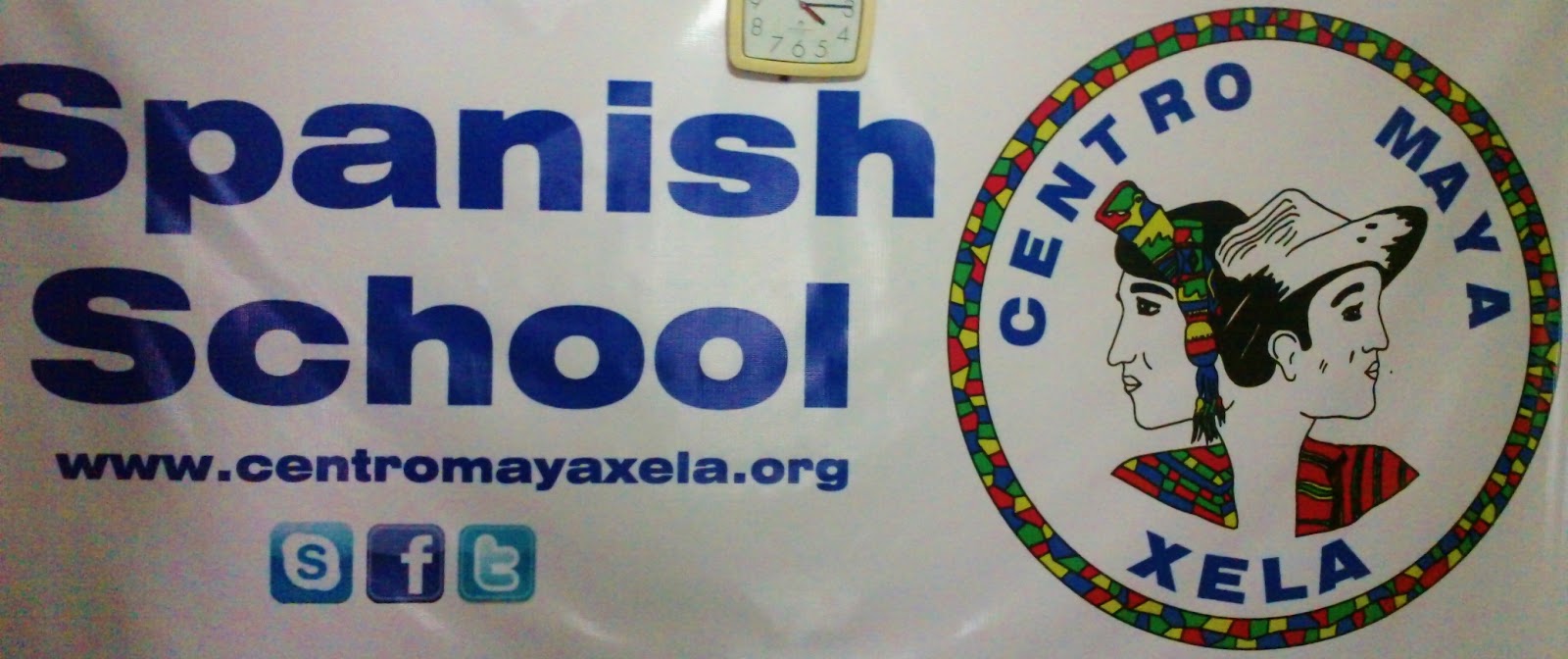What I’ve
learned in Xela
- I have a deep respect for Mayan indigenous groups.
- I have a deep respect for Mayan indigenous groups.
·
I love navigating myself through large cities
and that feeling of being “lost”.
·
Giving makes me feel great inside. Por ejemplar - giving two little boys my
piece of pastel (cake) that I bought
at the bakery; giving a homeless man my refresca
(cold drink).
· There are places in Latin America where it’s safe for a woman to walk alone at night.
- I'm not equipped to survive in cold weather.
· I love making home-made tortillas with lunch and dinner, the smell of sautéed plantains, and the tastes of chocolate caliente con arroz and pancakes with miel (honey).
· There are places in Latin America where it’s safe for a woman to walk alone at night.
- I'm not equipped to survive in cold weather.
· I love making home-made tortillas with lunch and dinner, the smell of sautéed plantains, and the tastes of chocolate caliente con arroz and pancakes with miel (honey).
.JPG) |
| tamales y tortillas |
Spanish lesson
After each meal you say “muchas gracias” and in return everyone accompanying you says “buen provecho” (good benefit).
My host-family
I cannot thank my host family enough for their
hospitality, especially my host-mama, Aniela. She made me
feel like an addition to her family. She took care of me one day I was not
feeling well, and warned me of the dangers of Latin men. By the way, her
cooking is phenomenal – always in her kitchen cooking up some Latin
deliciousness and introducing me to new flavors! Muchas gracias por todas.
Teaching English at K’amawanik Escuela
Lesson #5
·
Review of last week’s vocab
·
Weather conditions and the outdoors
·
Clothing and body parts (sang “head, shoulder’s,
knees and toes)
·
Played “Simon Says” to practice learned clothing
and body parts
Lesson #6
·
Greetings and introductions
·
Self-expressions
·
Played the question game
 |
| We celebrated our time together with cake |
 |
| I love them!! |
 |
| My student, Azucena, teaching me K'iche. |
"Dios te tocó el corazón Sarah por donar los pizarrones. Hace tres años buscamos. El año pasado el mes de octubre fuí con las monjas de aromas y con el gobierno de mi pueblo y no me dieron. Gracias a tí, a tus amigos y tu familia." (Abraham)
"God touched our hearts, Sarah, for donating the boards. We've looked for three years. Last year in October I went to the nuns of aromas and the government of my people and they I did not give. Thanks to you, your friends and your family." (Abraham)
.JPG) |
| Abraham Ajiataz Calel (Teacher of K'amawanik Escuela)
FACT: Only 7% of students at K'amawanik graduate from secondary school. If money is limited then the families typically choose their sons to finish school over their daughters. That is why Centro Maya Xela's scholarship program to help Mayan women go to university is so very important.
|
More photos:
 |
| My Volunteer site family (Central Maya Xela) |
.JPG) |
 |
.JPG) |
| Xela |
.JPG) |
| Plaza Central in Xela |
.JPG) |
| Xela |
.JPG) |
| Santa Maria Volcano and cemetery |
.JPG) |
| Tecun Uman |
.JPG) |
| Plaza Central in Xela |
 |
| Santa Maria from my balcony |
 |
| San Francisco el Alto |
Donate to
Educate
I've reopened the website for continued donations out of
recommendation from a contributing mentor. Please give those who hold education
to the highest standards this website for information on how to donate.
Travel Update
I’m sure you noticed I didn't make it to Belize…this was due to my wound, time and money (I’m not that disappointed – It’s so close to Florida and will be a snorkel trip for me in the future). I leave Xela the 31st of May and head to the Highlands of Guatemala. I really love Guatemala and don’t want to leave so I’m slowing down the itinerary. After the Highlands, I still plan to bus through El Salvador and Honduras very briefly before reaching the Pacific beaches of Nicaragua – for sun, ocean, surf, kayaking, nature, new friends and parties! Yes!
Blog
I've added some "Helpful Travel Resources/Websites" (located at the bottom of my blog profile). These sites will help you start to plan your safe, international travels. If you have any requests for additional travel resources please email me at sarahpaulick@gmail.com so I may help you. I also added "Google Translate" so you can read my posts in any language needed (located directly under "About Me" on left side of profile).
Quote
"Be the change you want to see in the world." Mahatma Gandhi
Blog
I've added some "Helpful Travel Resources/Websites" (located at the bottom of my blog profile). These sites will help you start to plan your safe, international travels. If you have any requests for additional travel resources please email me at sarahpaulick@gmail.com so I may help you. I also added "Google Translate" so you can read my posts in any language needed (located directly under "About Me" on left side of profile).
Quote
"Be the change you want to see in the world." Mahatma Gandhi
.JPG)
.JPG)
.JPG)
.JPG)
.JPG)


.JPG)
.JPG)

.JPG)
.JPG)









.JPG)
.JPG)

.JPG)

.JPG)

.JPG)
.JPG)
.JPG)
.JPG)
.JPG)
.JPG)
.JPG)
.JPG)
.JPG)
.JPG)
.JPG)
.JPG)
.JPG)

.JPG)